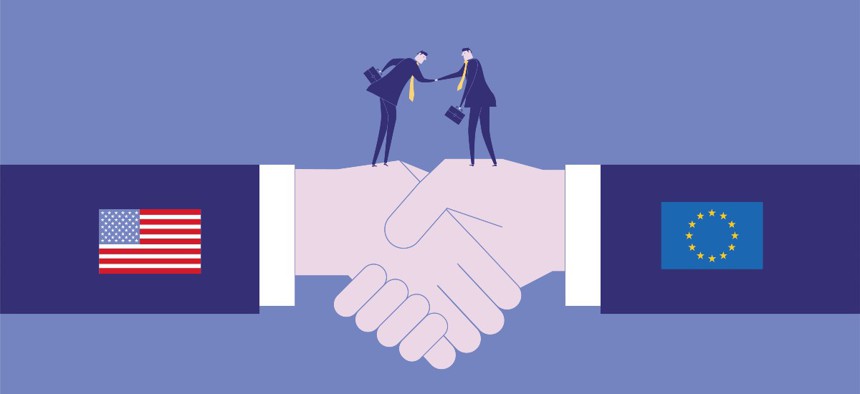US-EU Trade Meeting Highlights Semiconductor Independence, Emerging Tech Protocol

wenjin chen/Getty Images
The Trade and Technology Council’s second meeting, held in Paris, will further the transatlantic dialogue surrounding tech trade and usage policy.
The Biden administration is working to upgrade its trade relations with its European allies regarding international technology market regulations, as tensions continue to mount amid Russia’s war on Ukraine.
Speaking during a press call hosted by the National Security Council on Friday, senior administration officials announced forthcoming dialogues between the U.S.-EU Trade and Technology Council to review current transatlantic market policies and protocols surrounding various tech trade-related issues, including supply chain disruptions and emerging technologies.
The TTC leadership will convene on Monday, focusing on modernizing transatlantic technology trade with an emphasis on spurring semiconductor manufacturing in the U.S. and Europe.
“We're all tremendously excited about the second meeting of the TTC and really see it as a key opportunity to drive further cooperation across the Atlantic on a whole range of global trade and technology issues,” a senior administration official confirmed May 13.
While the council’s Monday meeting will address data privacy standards and policy related to emerging technology like artificial intelligence, it will also address diplomatic coordination regarding Ukraine.
“I think there's an unprecedented level of cooperation on sanctions and export control measures as part of our coordinated overall response to President [Vladimir] Putin’s war on Ukraine,” an administration official said. “The second meeting of the TTC, you're gonna see us deepen this partnership and announce a number of key outcomes, including deeper information sharing on exports, critical U.S. and E.U. technology, commitment to develop a joint roadmap on evaluation and measurement tools for trustworthy artificial intelligence management.”
Securing stronger domestic semiconductor manufacturing is part of the U.S. and E.U.'s broader goal to wean off of dependence on China and Russia for semiconductors and their input ingredients. More manufacturing will also alleviate concerns about a global supply chain backlog.
U.S. officials spearheading discussions with the TCC include Secretary of State Anthony Blinken, Secretary of Commerce Gina Raimondo and United States Trade Representative Katherine Tai.
“President Biden’s initiative to align some of the world’s largest economies on the most important trade and tech issues of the day is bearing very significant fruit and delivering real results,” Blinkin said at a press conference ahead of the meeting on Monday. “Together we’re working to shape norms and set standards on emerging technology, build more diverse and resilient supply chains, coordinate our approaches to export controls and investment screening mechanisms, acting together to stop unfair trade practices that harm our workers and our companies.”






